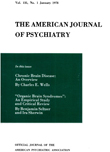A PSYCHOSOMATIC STUDY OF ALLERGIC AND EMOTIONAL FACTORS IN CHILDREN WITH ASTHMA
Abstract
1. Eighteen children, hospitalized for asthma, when exposed to their own house dust showed no demonstrable change in their respiration irrespective of their skin sensitivities to house dust.
2. Our clinical studies describe a need for closeness in the asthmatic child which is expressed here as a regressive wish. This regressive wish is felt by the child's ego as obstructive to further growth and development, and therefore as dangerous. This psychological conflict allows for an explanation of why hospitalizations lead to improvement of asthmatic symptoms.
3. We have described a methodology for validating clinical impressions. Our results are reported as trends which hold true only for this asthma group vs. this control group. We think that the analysis of our psychological test data shows that it is possible— though difficult—to devise objective ways of measuring dynamically meaningful hypotheses. We also feel there is good reason to believe that our particular choice of hypotheses has been fruitful in the study of asthma in children.
4. In a clinical study of the mothers of asthmatic children, we found evidence of the mother's wish to maintain the child in an infantile dependent state. Further, that this way of dealing with the asthmatic child stemmed from mother's own early unresolved conflicts.
Access content
To read the fulltext, please use one of the options below to sign in or purchase access.- Personal login
- Institutional Login
- Sign in via OpenAthens
- Register for access
-
Please login/register if you wish to pair your device and check access availability.
Not a subscriber?
PsychiatryOnline subscription options offer access to the DSM-5 library, books, journals, CME, and patient resources. This all-in-one virtual library provides psychiatrists and mental health professionals with key resources for diagnosis, treatment, research, and professional development.
Need more help? PsychiatryOnline Customer Service may be reached by emailing [email protected] or by calling 800-368-5777 (in the U.S.) or 703-907-7322 (outside the U.S.).



